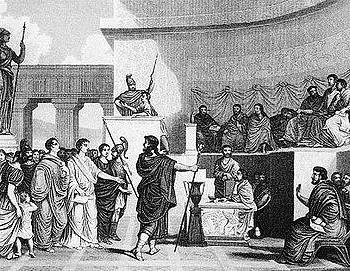Responsibility of heirs for the debtor's debts: article of the Civil Code of the Russian Federation with comments
Many people think that being an heir is profitableYou can get an apartment, a car or some other property. But they at the same time forget that, in addition to profits, the heirs can be responsible for the debts of the testator. This means that a rich relative can not only leave the villa, yacht and sports car, but also multi-million debts for loans and utilities.

Answer in court: "I did not know anything," hardly anyone will be interested in later. We will try to prepare for the situation when the relative left behind him not the long-awaited millions of dollars, but huge debts, as the heirs' responsibility for the debtor's debts is prescribed in the legislation. More on this further.
Responsibility of heirs for the debtor's debts: Roman law
The historical roots of the tradition are inherited not onlyproperty and means, but also various obligations go back to Roman law. It was there that the procedure for transferring rights and duties of a private-law nature after the deceased to other relatives was regulated. As for natural law, it only meant providing the parents with their children. That is, according to him, no debts and duties should not be transferred, but only certain property.

But in Ancient Rome this state of affairswas not formed immediately. The property of the deceased remained for a long time in the "family", "surname", in modern interpretation it means that among all relatives, and his duties ceased.
The law of Justinian changed this right, andthe responsibility of heirs for the debtor's debts, as well as his duties, first appeared. Of course, the functions of the personal nature of the husband, his father, no one forced to perform. However, duties of a public nature, for example, guardianship and trusteeship, passed to heirs. If they did not know anything about the debts and various obligations of the deceased relative, this did not absolve them from the coming legal position. Many norms of Roman law exist and now in our legislation.

Civil Code of the Russian Federation. Article 1175: responsibility of heirs for the debtor's debts
The modern Civil Code presupposestransition to a new owner not only of property, but also of various debt obligations of a property nature. This assumes Art. 1175 "Responsibility of heirs for the debtor's debts". But in this legal norm there is one feature - it does not have a clear definition of duty. For a better understanding it is necessary to get acquainted with other articles of the Civil Code, but we will try to disassemble the basic nuances.
When does "happiness" come about paying someone else's debts?
"Happiness" to pay other people's financialcommitment comes immediately at the time of entering into the inheritance. Of course, a citizen may not know anything about the deceased's debts, but in the event of the official adoption of a new legal provision, "ignorance of the law does not absolve from responsibility." This means that he agreed to an apartment - be kind, pay for the obligations of the former owner. And there can be several of them:
- Loans and borrowings in credit and financial institutions.
- Obligations on payments of rent.
- Debts for utility bills and housing and communal services.

Duties of a personal nature
Of course, personal obligationscease from the moment of death of a citizen. That is, the heir is not obliged to continue to pay alimony to minor children of the deceased, as it was in ancient Rome.
However, if you accumulated debts on child support for previous years, they will have to pay to the assignee.
In addition to these, to personal payments canvarious compensations of moral or material harm should be included. For example, a certain citizen caused bodily injuries to another. The court awarded him moral compensation to the victim, but he died. In this case, the heirs do not have the responsibility of the debtor's debts. The Civil Code of the Russian Federation refers to such a case as a duty of a personal nature.
How to split the debt?
Limits of responsibility of heirs to debtsThe testator is provided depending on the share that the assignee will receive. For example, a certain citizen left the apartment. The relatives who divided it into equal shares turned out to be four. Consequently, all debts of the property nature of the deceased must be divided into 4 parts by the number of successors.

What if the debt was "hanged" on one?
Often there are cases when the "divided the orange"several relatives, and the court awarded a bank loan to one. Many ask the question: is it legal? In fact, yes. Despite the fact that all heirs are responsible for the debts of the testator, banks and various organizations sometimes sue one successor.
The difficulty is that in most casessuch trials are not suspected by the "lucky ones". They learn about them only when the bailiffs' services initiate executive proceedings, according to which they legitimately withdraw from the bank accounts the amount awarded.

To sue the bank in order to return the moneyis useless, because, from the point of view of the legislation, all procedures have been followed. The arguments that "I did not know about the court", "they did not warn me", they will not return the money. Of course, you can try to cancel the court decision, but the return of funds will be much more difficult.
In this case, the so-called right comesregress - an heir who paid unilaterally all the debt of the deceased, or an amount that is more than his share, has the right to demand extra money paid through the court from the remaining successors.
If the heir died before he entered into the inheritance
What to do in cases where the transferee died beforeformal acceptance of legal status? In whom will the burden of paying the bills lie? It turns out that in this case the heirs are not liable for the debtor’s debts, as well as for the property.
Let's give an example: a certain citizen A enters into the inheritance left by citizen B, but he dies before official recognition of the new legal status. In this case, the children and relatives of A will not bear the unfulfilled financial obligations of B, since But officially did not have time to accept the inheritance But relatives will also not receive property B.
Terms of requirements
Banks very often until the last momentpostpone appeals to the court on new successors. It is understandable: the longer the delay, the more you can sue unsuspecting heirs. But we must not forget about the terms of the requirements, that is, we mean the statute of limitations.
Currently, any credit organizations andCompanies must make claims within 3 years, according to the Civil Code. However, the day from which the term begins, does not begin with the end of the term for the expiration of debt obligations, as in ordinary civil cases, but with the death of the testator. If within three years the bank has not demanded a debt, then after that it goes to its own losses. Require after this time, no one has the right.

If the debt is more inheritance
Some are interested in the question, whatliability of the heir for the debts of the testator, if the amount of obligations is greater than the property received. In this case, the successor does not have to pay on them, as the law can not exceed the value of the inheritance.
The role of the notary
The notary is responsible for preservationinheritable property. After a person’s death, creditors have the right, within 6 months (during this time, the issue of inheritance is resolved) to file a claim for debt claims.
The notary has no right to satisfy them.claims and alienate the property of the deceased debtor in their favor. His authority includes only the registration of a statement of creditors and the notification of potential successors.
But, as a rule, many banks do not use thisright, and sue the heirs after they accept all rights, so as not to “scare away” future debtors, from which it will be possible to claim amounts in court. Otherwise, these debts will go to the loss of credit institutions.
What the future heir needs to know
Entering inheritance rights, remember:
- Ignorance of debt and various financialcommitments do not exempt from payment. The law provides that the future successor is obliged to find out about them independently within a 6-month period.
- Together with the property, the debts of the deceased are transferred.
- Refusal from inheritance completely exempts from all debts of the testator.
- The term requirements of financial obligations is limitedthree years. It begins immediately after the death of the testator. After this time, no one has the right to demand obligations, they go to the losses of enterprises.
- All the heirs are jointly and severally liable to the debts of the deceased in proportion to the share of the inheritance.
- If the property is less than financial obligations, the law provides for a refusal to pay on them. In other words, you can not get only debts.
We hope that the article will be useful, because it is not known what can expect us tomorrow. As they say, who warned - that is armed.
</ p>>


